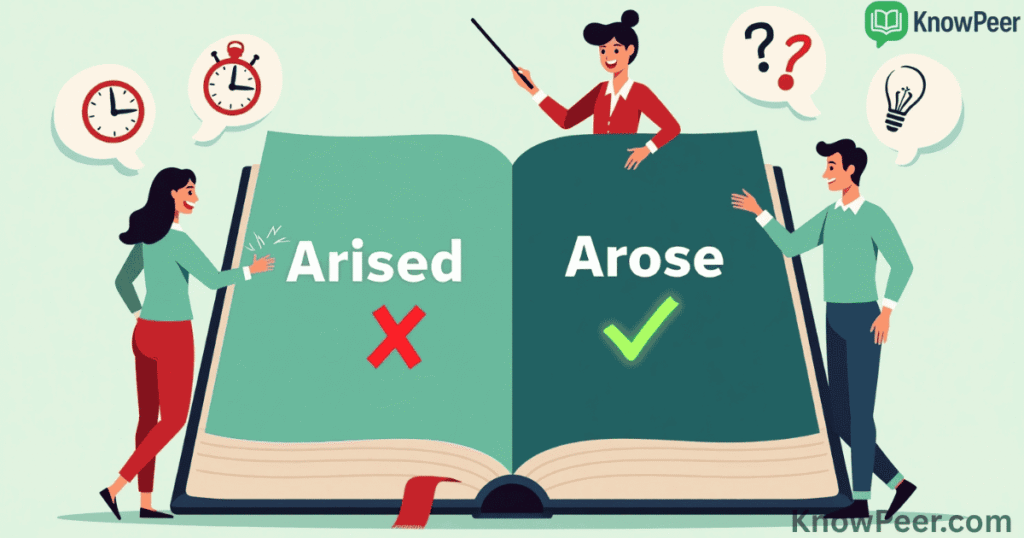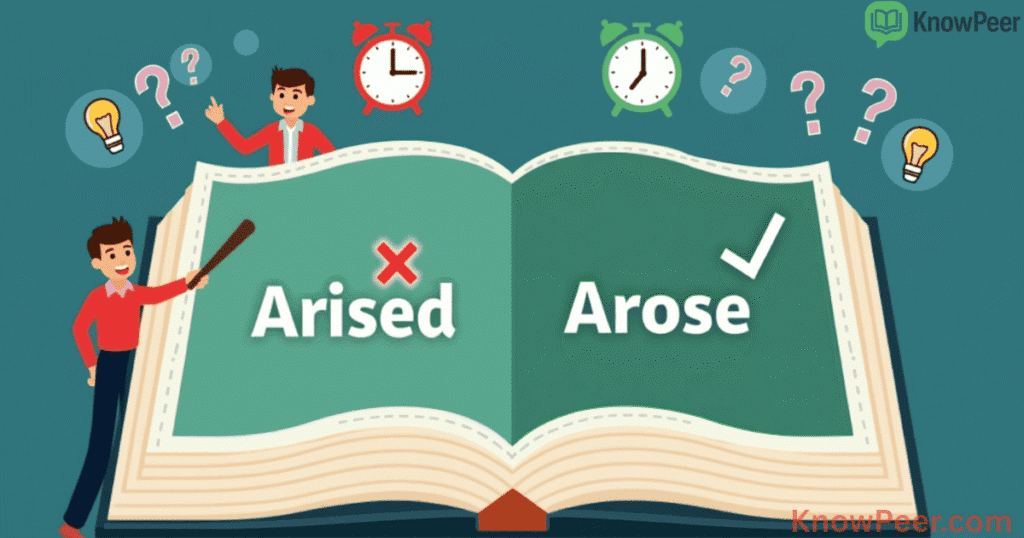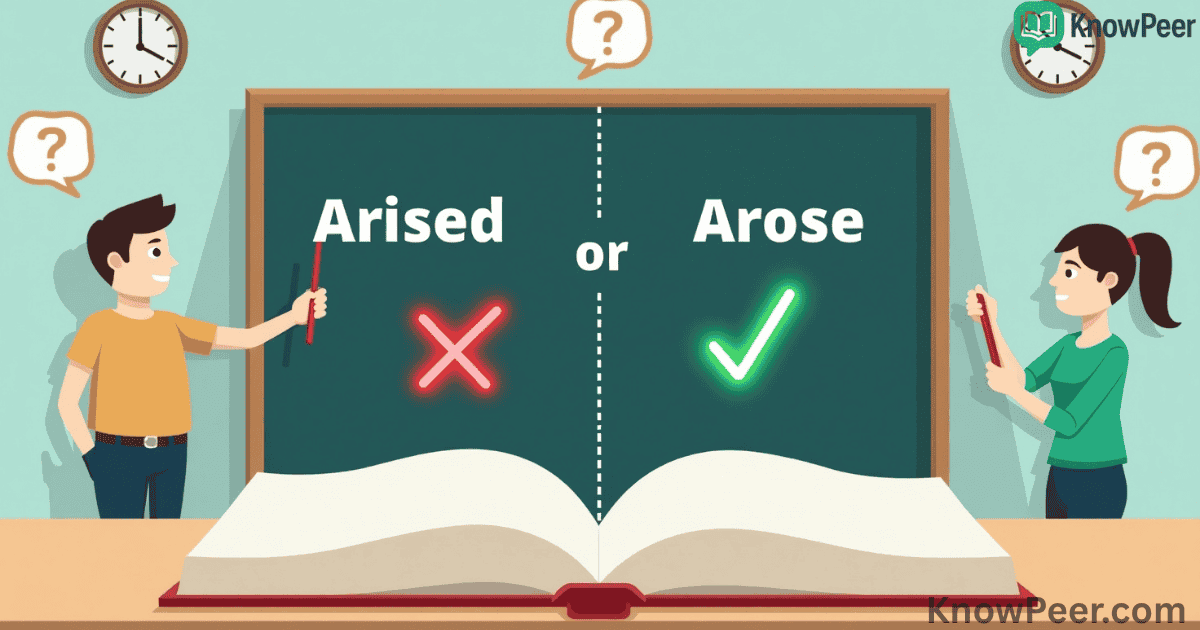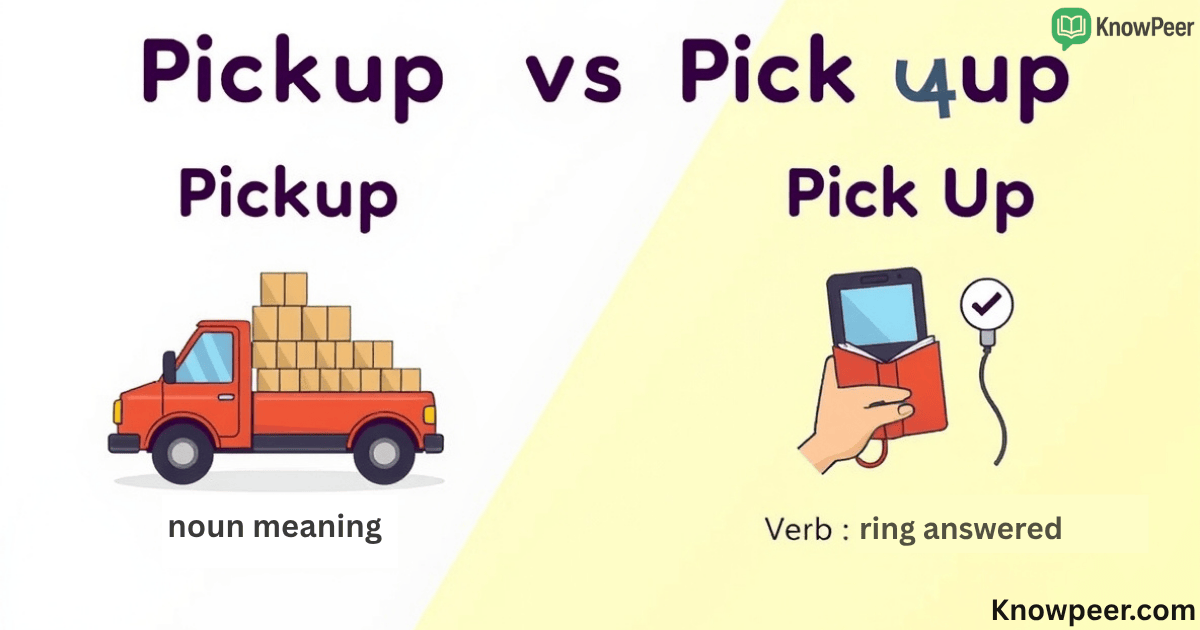Language can be confusing, especially when it comes to irregular verbs. One such word that causes a lot of trouble is “arise”. People often wonder whether the correct past tense is “arised” or “arose”. The answer is simple, but the reason behind it is quite interesting. Understanding this can help you write and speak better English.
In this article, we’ll explain everything you need to know about this verb. We’ll talk about its meaning, usage, past forms, and why “arised” is incorrect. You’ll see real-life examples, understand pronunciation, and even learn some history behind the word. By the end, you’ll never make this mistake again.
Why the Confusion Over Arised or Arose?
Many English learners—and even native speakers—struggle with choosing between arised or arose, and the confusion is understandable. English verbs are divided into regular and irregular verbs. Regular verbs form the past tense by simply adding “-ed” at the end, like “walk” becoming “walked” or “jump” becoming “jumped.” So, people often assume that “arise” becomes “arised.” But that’s incorrect. Arise is an irregular verb, which means it doesn’t follow this common rule.
The proper past tense of arise is arose, and its past participle is arisen. The mistake of using “arised” usually happens when someone tries to apply regular verb rules to an irregular verb. This is especially common among those learning English as a second language, or when using grammar checkers that don’t always flag incorrect forms immediately.
Another reason for the confusion comes from how similar “arise,” “raise,” and “rise” sound. All these verbs relate to things going up or appearing, but they have different conjugations. Understanding the difference between arise and arose requires focused study, practice, and sometimes mnemonics for grammar. Once you learn the pattern—arise, arose, arisen—it becomes much easier to avoid this mistake in speaking and writing.
Arise vs Arose: Definitions and Clear Differences
The word “arise” means to come up, appear, or begin to exist. You can use it when talking about problems, situations, or even emotions. For example, you can say, “A problem may arise during the meeting.” Here, you are talking about something that might happen. This is the present tense form.
The past tense form is “arose”. So, if the problem already happened, you would say, “A problem arose during the meeting.” The word “arised” does not exist in proper English. If you try to use it, grammar checkers will flag it. You’ll also confuse your readers or listeners. It may sound right at first, but it is never the correct form.
Here’s a quick table showing the right and wrong forms:
| Tense | Correct Form | Incorrect Form |
| Present | arise | — |
| Past | arose | arised |
| Past Participle | arisen | arised |
Grammar Guide: All the Tenses of Arise
Understanding all the forms of “arise” helps you use it confidently. In the present tense, we use “arise” to describe things that happen now or regularly. In the past tense, we say “arose” to describe something that already happened. For example, “A dispute arose last week.” The past participle is “arisen”, used with helping verbs like has or have. So you can say, “A few issues have arisen.”
The future tense uses words like will or going to. For instance, “Issues will arise during the transition.” You can also use it in the continuous tense by saying, “Problems are arising quickly.” Let’s look at all these forms in one place:
| Tense | Example |
| Present | I hope no issues arise today. |
| Past | A few concerns arose yesterday. |
| Future | More questions will arise soon. |
| Present Perfect | Some doubts have arisen. |
| Present Continuous | Issues are arising again. |
| Past Perfect | Problems had arisen before that. |
| Future Perfect | Mistakes will have arisen by then. |
How ‘Arise’ and ‘Arose’ Are Used in Real Life

Understanding how ‘arise’ and ‘arose’ are used in real-life situations can make it easier to remember their correct forms. In everyday conversations, people use arise to talk about problems, opportunities, or situations that come up unexpectedly. For example, someone might say, “New challenges often arise at work,” or “Conflicts may arise in group discussions.” This shows the present tense of arise, which refers to things happening now or regularly.
When talking about something that already happened, the correct word is arose. In the past tense, you might hear, “A serious issue arose during the meeting yesterday,” or “A misunderstanding arose between the two friends.” These examples clearly show the arose grammar form in use Arised or Arose. You won’t hear fluent speakers say “arised” in these situations because it’s not correct English.
In business, law, education, and even casual speech, you’ll find countless examples of arise and arose. In formal writing, using the correct usage of arose helps you sound professional and well-educated. Misusing forms like “arised” can reduce the clarity and credibility of your message. Learning these forms through real-life examples not only improves your grammar but also builds stronger communication skills in all areas of life.
Why “Arised” Sounds Right But Is Always Wrong
English learners often try to apply regular rules to every verb. They add -ed to make past tense. So they wrongly believe “arised” is the past of “arise”. This is a natural mistake, but still incorrect. The verb “arise” is irregular, which means it has unique past forms that must be memorized.
Another reason people say “arised” is because of similar verbs like “raise” or “praise”, which do become “raised” and “praised”. But these are different verbs Arised or Arose. That’s why mixing them up causes confusion. To avoid this, always check a trusted grammar guide or dictionary. You’ll find that “arised” is not listed anywhere as a valid verb.
How to Pronounce Arise, Arose, and Arisen
Correct pronunciation helps with both speaking and listening. Many learners say these words differently than native speakers. Let’s break it down.
Arise is pronounced /əˈraɪz/, where the stress is on the second syllable.
Arose is /əˈroʊz/, with a long “o” sound.
Arisen is /əˈrɪzən/, again with stress on the second syllable.
You can listen to these words on tools like YouGlish or the Cambridge Dictionary site. Practicing these out loud helps build fluency and boosts confidence. Native speakers use these words smoothly, so hearing and repeating them is a great way to learn.
Similar Words and Useful Synonyms
Sometimes, you might want to replace “arise” or “arose” with another word. This can help you express the same idea in a different way. For “arise”, you can use words like occur, emerge, appear, or come up. Each of these has a slightly different meaning, but they work well in many situations.
For “arose”, use alternatives like originated, happened, emerged, or resulted. These words often appear in academic or formal texts. Choosing the right synonym depends on your sentence. Here’s a comparison table:
| Word Used | Similar Word | Example |
| arise | occur | Problems may occur anytime. |
| arose | emerged | A new idea emerged yesterday. |
| arisen | developed | New problems have developed. |
Mistakes People Often Make and How to Fix Them
One of the most common mistakes learners make is using “arised” as the past form of arise. This error happens because many verbs in English are regular, so people assume all verbs follow the same pattern. But arise is an irregular verb, and its correct past form is arose, not “arised.” Saying “A problem arised” sounds natural to some, but it’s grammatically incorrect. The correct sentence is “A problem arose.”
Another frequent mistake is mixing up arose and arisen. People might say “The issue has arose” instead of “The issue has arisen.” This happens when the difference between past tense and past participle isn’t clear Arised or Arose. To fix this, always remember: arise (present), arose (past), arisen (past participle). It’s a simple pattern but essential to get right.
To avoid these issues, study irregular verb examples regularly. Use an English verb chart or flashcards for practice. Reading books, listening to native speakers, and using grammar checkers like Grammarly can help catch mistakes. Speaking the words out loud and practicing with short sentences will also improve memory and pronunciation. Over time, these small steps will build your confidence and eliminate confusion with verbs like arise.
Tricks to Always Remember Arise vs Arose

One fun way to remember is to use mnemonics. Think of a short phrase like: “She arose at dawn, problems arise at night.” This connects both forms in a logical way. You can also write the forms on flashcards and practice them during free time.
Another trick is to use them in simple sentences every day. For example, write five present tense sentences and five past tense ones using arise and arose. Say them aloud. Repeat them. The more you use the words, the easier it becomes to remember which is correct and when.
The Origin and History of the Word “Arise”
The word “arise” comes from the Old English word “ārīsan”, meaning to get up or rise. Over time, the spelling and form changed. It became “arise” in modern English, and its past form became “arose.” These changes happened naturally as the English language evolved.
Interestingly, “arose” has been used in literature and religion for centuries. The King James Bible uses phrases like “He arose from the dead”. The past participle “arisen” also shows up in older texts, showing how deeply rooted these forms are in the language.
Final Thoughts
Now you know the difference between arise, arose, and arisen. More importantly, you understand why “arised” is always wrong. The correct past tense of arise is arose, and the past participle is arisen. Using these forms correctly will help you speak and write more clearly and professionally.
Don’t worry if you’ve made this mistake before. Many people have. The key is to keep practicing and correcting yourself. Use the tables, examples, and tricks in this article whenever you feel unsure. Soon, you’ll master this tricky verb—and rise above the confusion for good.











